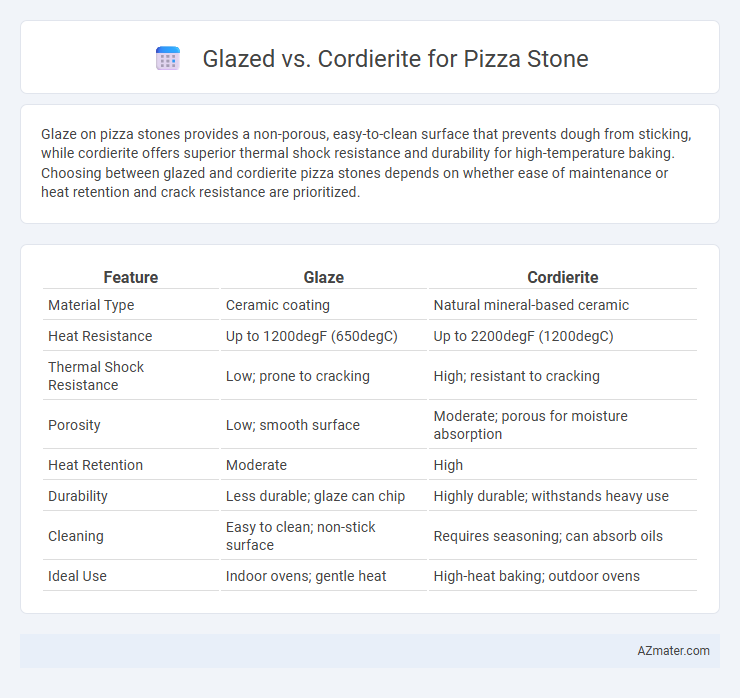Glaze on pizza stones provides a non-porous, easy-to-clean surface that prevents dough from sticking, while cordierite offers superior thermal shock resistance and durability for high-temperature baking. Choosing between glazed and cordierite pizza stones depends on whether ease of maintenance or heat retention and crack resistance are prioritized.
Table of Comparison
| Feature | Glaze | Cordierite |
|---|---|---|
| Material Type | Ceramic coating | Natural mineral-based ceramic |
| Heat Resistance | Up to 1200degF (650degC) | Up to 2200degF (1200degC) |
| Thermal Shock Resistance | Low; prone to cracking | High; resistant to cracking |
| Porosity | Low; smooth surface | Moderate; porous for moisture absorption |
| Heat Retention | Moderate | High |
| Durability | Less durable; glaze can chip | Highly durable; withstands heavy use |
| Cleaning | Easy to clean; non-stick surface | Requires seasoning; can absorb oils |
| Ideal Use | Indoor ovens; gentle heat | High-heat baking; outdoor ovens |
Introduction: Glaze vs Cordierite Pizza Stones
Glaze and cordierite pizza stones differ primarily in material composition and heat retention properties, affecting cooking performance. Cordierite stones are prized for their exceptional thermal shock resistance and even heat distribution, making them durable for frequent use. Glazed stones offer a smoother, non-porous surface that can reduce sticking and simplify cleaning but may be less resistant to thermal stress compared to cordierite.
What Is Cordierite Pizza Stone?
Cordierite pizza stones are made from a durable mineral known for its exceptional thermal shock resistance, making it ideal for high-temperature baking. Unlike glazed stones that may have a smooth, sealed surface, cordierite stones absorb moisture effectively, resulting in crispier pizza crusts. This mineral composition ensures even heat distribution and long-lasting performance, favored by both home cooks and professional chefs for consistent baking results.
What Is a Glazed Pizza Stone?
A glazed pizza stone features a non-porous, glass-like coating that prevents dough from sticking and makes cleaning easier compared to unglazed stones. This glaze enhances heat retention and distribution, allowing for a crispier crust by maintaining consistent cooking temperatures. Unlike cordierite stones, which are prized for their thermal shock resistance due to their mineral composition, glazed stones prioritize surface smoothness and moisture resistance for optimal pizza baking performance.
Heat Retention and Distribution
Cordierite pizza stones excel in heat retention and even heat distribution due to their dense, crystalline structure that withstands high temperatures without cracking, ensuring consistent cooking. Glazed pizza stones, while offering a smooth, non-porous surface that can prevent sticking, often have less efficient heat retention and may produce uneven heat distribution compared to cordierite. For optimal baking performance, cordierite stones provide superior thermal stability and more uniform heat transfer ideal for crispy, well-cooked pizzas.
Durability and Lifespan
Cordierite pizza stones are renowned for their exceptional durability and thermal shock resistance, enabling them to withstand rapid temperature changes without cracking. Glazed pizza stones, while offering a smooth, non-porous surface that simplifies cleaning, often sacrifice some durability due to the fragility of the glaze layer under high heat stress. Over time, cordierite stones generally exhibit a longer lifespan because their heat-resistant composition maintains structural integrity better than glazed counterparts prone to glaze chipping or cracking.
Cleaning and Maintenance
Glaze pizza stones feature a smooth, non-porous surface that resists food sticking, making cleaning easier with simple wiping or washing. Cordierite stones are porous and absorb oils and moisture, requiring careful hand washing and thorough drying to prevent cracking and odors. Regular maintenance of cordierite involves avoiding soap and using a stiff brush, while glazed stones tolerate more straightforward cleaning methods without compromising durability.
Cooking Performance: Crust Texture
Glaze on pizza stones creates a smooth, non-porous surface that can lead to a softer crust by trapping moisture during baking, making it ideal for chewy, less crispy pizzas. Cordierite stones, known for their excellent heat retention and even heat distribution, absorb moisture effectively, producing a crispier and more textured crust. The choice between glaze and cordierite influences crust texture significantly, with cordierite preferred by those seeking a traditional, crunchy pizza base.
Safety and Food Interaction
Cordierite pizza stones are highly valued for their thermal shock resistance and non-porous surface, which reduces the risk of bacterial buildup and ensures safer food contact. Glazed pizza stones feature a glass-like coating that prevents absorption of food and liquids, making cleaning easier but sometimes affecting heat retention and durability. Both materials are food-safe when properly maintained, but cordierite is often preferred for high-temperature cooking due to its natural, chemical-free composition.
Price Comparison
Glazed pizza stones typically cost more due to their finished surface, which provides easier cleaning and enhanced durability compared to unglazed cordierite stones. Cordierite stones are often priced lower because of their natural, porous structure that absorbs moisture and allows for even heat distribution but may require more maintenance. The price difference can range from 15% to 40%, with glazed stones appealing to users prioritizing low upkeep and cordierite favored by cost-conscious buyers.
Which Pizza Stone Should You Choose?
Cordierite pizza stones offer superior heat retention and thermal shock resistance, making them ideal for high-temperature baking and frequent use, while glazed pizza stones provide a non-porous surface that is easier to clean but may crack under rapid temperature changes. Choosing between glaze and cordierite depends on your cooking style: cordierite suits those seeking durability and consistent heat distribution, whereas glazed stones benefit users prioritizing convenience and low maintenance. Consider the balance between performance longevity and ease of cleaning to select the best pizza stone for your needs.

Infographic: Glaze vs Cordierite for Pizza Stone
 azmater.com
azmater.com